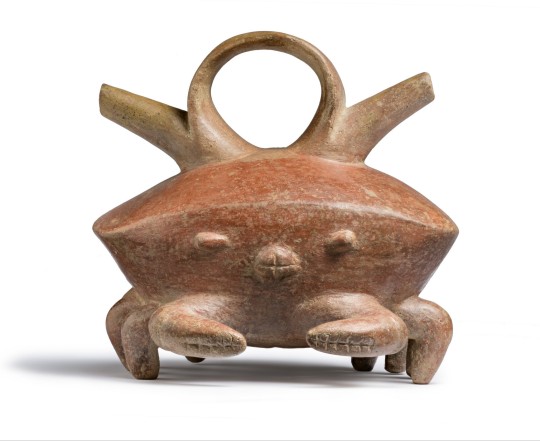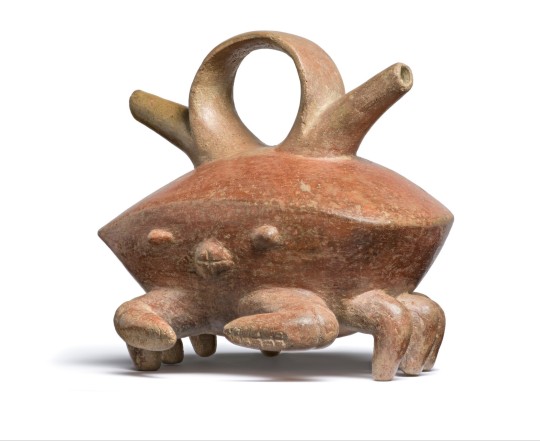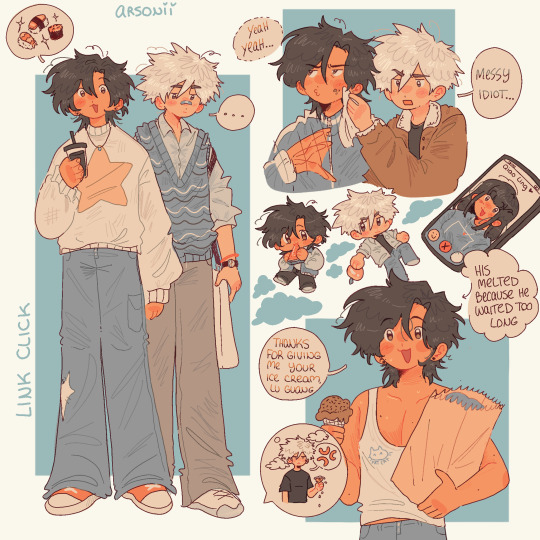Text
I never posted the full version of this edit in here. So here you go, I wish you a depressing 091305 to you all!
140 notes
·
View notes
Text
The Night We Met - a Link Click PMV
View on Youtube
#aaaaaaaaaaaaaa#this is so good#brb gonna cry in a corner#give me 3-5 workdays to recover#link click
172 notes
·
View notes
Text


~ Crab Vessel with Double Spout.
Place of origin: Colombia, Calima Region
Period: Ilama Period
Date: 1500 B.C.-A.D. 100
Medium: Ceramics
21K notes
·
View notes
Text
What the- what's going on in bsd
0 notes
Text

IM NOT DEAD IM BACK IM SO SORRY TUMBLR FRIENDS 🙏🙏
660 notes
·
View notes
Text


love love love
1K notes
·
View notes
Note
could you maybe draw li tianxi and qiao ling hanging out? just want to see more happy moment between the best girls :3

I was in a mood for the seaside, I hope you like it!
159 notes
·
View notes
Text




Where do we end up when we save the world?
455 notes
·
View notes
Text
Link Click, internet slang, and Chinese culture
On the Chinese internet, there's a nickname for Link Click called Shiguang Daidaoren, meaning "the blade-bringers of time" instead of "the managers of time," the original title. Calling something "blade" is Chinese internet slang for something being angsty; whether it be derivative content or the originals themselves. Another meme is that Link Click isn't zhiyu (治愈,healing), which it is tagged as on Bilibili, but zhiyu (致郁,causing depression).
Link Click, especially its first season, is a deeply emotional and sentimental show. And it's a shame that so much of it gets not so much lost in literal, linguistic translation as much as it does in cultural, contextual translation. Many people can understand Emma's pain of being away from her parents in a new city, working a difficult job. But watching the scrolling comments on Bilibili, you get the cultural context of it -- the massive migration patterns within China from rural to urban, the children growing up and having to shed their local fangyan (方言) or, less formally, tuhua (土话)("speech of the locations" and "old-fashioned words," respectively) in exchange for Beijing Mandarin. This massive nation, nearly twice the population of Europe and only about 6% smaller in terms of area, is so diverse as to have created (what is close to) an immigrant experience for its citizens entirely within its borders. You visit your parents on Chunjie (春节), lunar/Chinese new year, on packed trains during the largest singular human migration event on Earth, annually. And when you get home, you are faced with something different from the cities you now live in -- everything from the buildings to the furniture to the clothes they wear. I hadn't realized how deeply I missed the gaudy, garish mianao (棉袄,coats) and mianbei (棉被,cotton blankets) until I saw familiar shades of too-bright burgundy in the hands of Emma's parents. The concept of this original-home, laojia (老家, old-home) is so strongly baked into our lives that every time I meet another Chinese person, I cannot but help but ask them 你老家哪儿啊? Where is your original-home? And even though I know nothing about Chinese geography, every time I hear the answer, a little piece slots into place nonetheless.
In slang, if something made you cry or otherwise feel an emotion you weren't expecting to feel, you refer to it as pofang (破防,breaking defences). And maybe it says something that an expression of human emotion is viewed as a failure in some defences, but that's introspection for another time. Watching on Bilibili, with its hundreds of comments scrolling by "My defences have been breached" and sobbing onomatopoeia, people in the comments saying that they miss their mothers and fathers -- I, too, miss my family. When Cheng Xiaoshi, in Chen Xiao's body, tried to speak his host body's local variation and came up with butchered dongbeihua (东北话, words of the east-north), I nearly fell out of my chair. It was the sound of home, of my grandmother telling us to hush around noon because our neighbours were napping and my grandfather showing me how to play spider solitaire.
Cheng Xiaoshi's breakdown in episode 5 hits hard for its vulnerability. "I'm scared of the dark" has the same literal meaning as "我怕黑," sure, but there is something devastatingly childlike in that three-syllable declaration of fear. Where English so often derives meaning from complexity, from winding metaphors and beautiful prose, Chinese can derive breathtaking meaning from less breath than it takes to say the word analogy. 我怕黑 is stripped of any grown-up pretenses of control or dignity. It is the barest this statement can be: I. Scared. Darkness.
And what he says following, too. 我害怕一个人. Longer yet no less potent. Alone, or lonely, has many translations in Chinese. 孤独. 寂寞. 孤单. 单独. Many more synonyms for all the different ways you can be lonely. But 一个人 is, once again, an almost child-like way of saying it. Before you have the vocabulary to express these complex emotions, 一个人 is a perfectly working expression. Translating it character-by-character, it means one singular person. It is something you say when you've been left behind. When you've been made to face everything by yourself. When the world is so, so, big, and you are just one singular person, with no companions to stand with you.
And, ah, Li Tianxi's Chinese nickname, 小希. It is the last character of her full name, with a "little" shoved right in front. It is an affectionate way to call someone younger than you. It is different from Xixi, its English rendition, because a repetition of the last character is a more generalized, affectionate nickname, whereas diminutives are almost always reserved for someone younger than you, when used in real life. The diminutive says don't be scared. I'm here now. I'll handle it.
There are endless details in Link Click that make everything about it seem a little bit more like home. The word 面馆 which means something a little, subtly different than "restaurant" or "noodles shop," a difference lost without the context of the phrase 下馆子 and the way adults say it with the gladness of once-children who only ate meat on new years. The "honorifics" as English calls them, to me more of just -- ingrained parts of someone's name. Within the snap of Mandarin syllables there is meaning and memory in every character. Jie, mei, di, ge, lao, da, xiao -- they are more than their literal meanings. They are a relationship, a promise.
Perhaps I am overthinking this, awkwardly Chinese as I am: too localized to be considered first-generation, too stubbornly attached to relate to second-generation. Maybe these linguistic subtleties only exist and matter in my mind, a writer of both languages (though I must say, my Chinese prose leaves… much to be desired) with a knack for pedantics. Regardless, I hope other Chinese fans of this show share this feeling. And surely, other people will, too. All the rural children who left home to pursue higher education and opportunities in faraway cities; the raised-in-poverty who spent their childhoods dreaming of buying their family new coats; the speakers of languages long since abandoned by their childhood friends. What a delight it is to see yourself in stories, neither exception nor abnormality but a norm. What a joy it is to be one of one point four billion.
417 notes
·
View notes
Text



the orv bookend standees i debuted at anyc!
62 notes
·
View notes
Text
Lu Guang's love language: Words of attack
The English subtitles for Link Click, from what I can see, universally translate Lu Guang's various insults towards Cheng Xiaoshi as "idiot." There may be a "moron" and "fool" or two in there, but I will be honest when I say that I don't really want to re-watch the entirety of seasons one and two to check. However, there is a little bit of subtlety in the exact words for "idiot" that Lu Guang uses.
Mandarin has… a lot of words for "idiot." Ones I can think off of the top of my head are 傻瓜,白痴,笨蛋, 蠢货,biao (an insult in the Muping dialect which I don't know the character for),二百五,傻子,无脑,傻逼. For your reference, those are just the insults that specifically mean "stupid." If we get into other insults, we'd be here all day.
So the conclusion is that insults in Mandarin are an art. And man, does Lu Guang master said art perfectly. The insult he most commonly uses for Cheng Xiaoshi is 弱智 (ruozhi, weak intellect) which is one that allude to disability (please take this with a grain of salt! I really, truly don't know anything about the disabled Chinese community, so it's possible that it doesn't really carry the same meaning). This particular insult is interesting, because it's a really hard-hitting insult. Like, if I call someone 笨蛋 (bendan, stupid egg), it's a pretty weak, sometimes even affectionate term, frequently used by children. But ruozhi is an actual, legit insult, that someone will punch you for calling them. It's also something I would categorize as kind of an adolescent-young adult insult -- you would hear older folk using 蠢货 or 白痴 more often for "idiot." But Lu Guang calls Cheng Xiaoshi that like it's his second name.
The way Lu Guang uses the term, it takes on its own affectionate feel to it. He uses it whenever Cheng Xiaoshi's done or said something he's not happy with, even when the action isn't necessarily [being an idiot]. It's got a similar feel as a resigned sigh, or perhaps frustration.
But there are times when Lu Guang uses an insult that isn't ruozhi. During episode five of season one, while he's comforting Cheng Xiaoshi after a dive, he calls him 傻瓜 (shagua, stupid melon). Shagua is probably one of the most gentle of all the "idiot" insults, tied with maybe bendan. It's frequently used as a term of endearment, especially between couples (make of that what you will). The "stupid" in shagua also means a slightly different type of stupid than the one in bendan. If I had to define it, sha is stupid in terms of wisdom, and ben is stupid in terms of intelligence, in D&D terms. Like, if I failed my physics exam, I would be more ben. If I didn't read through my insurance policy before requesting my medication and had to cough up forty dollars for them (totally didn't happen just a few hours ago), I would be more sha. So Lu Guang, here, is calling Cheng Xiaoshi something like "unwise" or "naive," which is very fitting for the situation.
Interestingly, during Cheng Xiaoshi's flashback to Lu Guang in episode one of season two, Lu Guang cycles through three different insults: baichi, chunhuo, and bendan. Of these, baichi and bendan are within the "yeah couples call each other this sometimes" group, and chunhuo is a more genuine, demeaning insult. The fact that three of the nine different Lu Guang dialogues Cheng Xiaoshi flashes back to include Lu Guang calling him an idiot in various affectionate ways is pretty funny, I won't lie to you. There's also that a vast majority of the remembered sentences, even the ones that don't explicitly say "idiot," are basically Lu Guang clowning on Cheng Xiaoshi. As a side note, it's interesting that the last thing memory-Lu Guang says is bendan -- the softest, most childish insult, and the one with the most explicitly affectionate connotations in general use.
Lastly, in the twelfth episode of the second season, when the two are in the tunnels fighting and Cheng Xiaoshi tells Lu Guang to not push himself, Lu Guang responds with "baichi, you're not doing much better than me." In this case, he switches from ruozhi to baichi likely because it's a more serious situation, where the almost joking ruozhi wouldn't have been as appropriate. The stupid in baichi (the chi) is more of a "dim-witted" connotation, akin to calling someone slow or head-in-the-clouds.
In conclusion, Lu Guang's insults for Cheng Xiaoshi are:
弱智 (ruozhi) -- basically his nickname for Cheng Xiaoshi at this point, commonly used when he's annoyed with him or wants to make fun of him. Appears to be the default when Cheng Xiaoshi does something he doesn't like in a dive.
白痴 (baichi) -- the most commonly used alternative to ruozhi, I can't see any patterns of its usage. Seems to be the one he defaults to when the mood isn't right for ruozhi.
蠢货 (chunhuo) -- used only once (that I could see) in a sentence without context, so… /shrug
傻瓜 (shagua) -- a rarer insult, seems to be the one he uses when he's trying to comfort Cheng Xiaoshi but still needs to insult him.
笨蛋 (bendan) -- a more teasing, casual insult, one he flings out when he just wants to insult Cheng Xiaoshi in a non-serious situation.
191 notes
·
View notes
Text
"How do you write such realistic dialogue-" I TALK TO MYSELF. I TALK TO MYSELF AND I PRETEND I AM THE ONE SAYING THE LINE. LIKE SANITY IS SLOWLY SLIPPING FROM BETWEEN MY FINGERS WITH EVERY MEASLY WORD THEY TYPE OUT. THAT IS HOW.
129K notes
·
View notes
Text
"brother-in-law" actually refers to two different concepts : 1) your spouse's brother and 2) your sibling's husband
Afrikaans has two words for brother-in-law : 1) swaer and 2) skoonbroer
both of these words, however, ambiguously refer to either of these concepts just like "brother-in-law" does in English. they are not separate words for the two kinds of brother-in-law. the reason we have two words is because we inherited swaer from the Hollandic zwager (cf. German Schwager, Swedish svåger), and skoonbroer from the Flemish schoonbroer, a calque of the French beau-frère
592 notes
·
View notes
Text


Am i the only one who imagined the first meet like this?? *swooon*
24K notes
·
View notes
Text

Hi, I wanted to redesign my zora Prince Link outfit... and took all day on this ;;
Patreon | Twitter | Instagram | Ko-Fi
3K notes
·
View notes
Text
that article going around abt firefox's new ad program is annoying bc it's phrased as though "mozilla has finally TURNED on its people and is SELLING YOU OUT for cold hard cash!!" when. that's not what's happening. it is specifically being implemented to discourage tracking behavior, and literally all the data they are giving to advertisers is aggregate and anonymized, which is like, the opposite of what that post wants you to worry about, lol
51K notes
·
View notes

